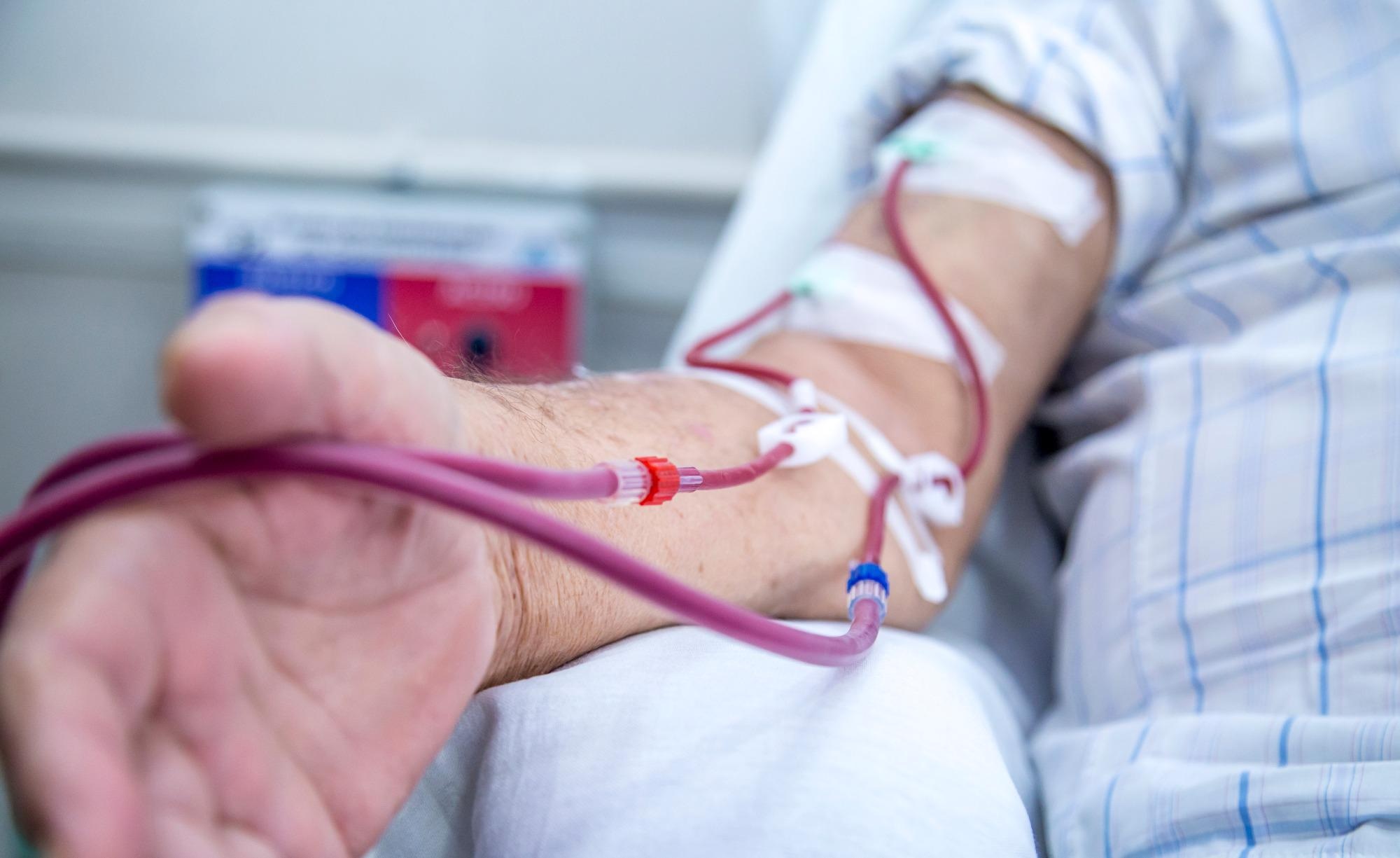SARS-CoV-2 infection risk among dialysis patients during Omicron surge
A recent study posted to the medRxiv* preprint server evaluated the antibody responses against severe acute respiratory syndrome coronavirus-2 (SARS-CoV-2) patients receiving hemodialysis.
Antibody responses elicited after primary vaccination (two vaccine doses) decrease in about 15% of dialysis patients. Previously, the authors of the study reported that low levels of circulating antibodies increased the risk of vaccine breakthrough infections by more than 10-fold. Often, breakthrough infections in dialysis patients result in hospitalizations. Reports suggest that only half of the dialysis patients agree to take a booster vaccine.
A booster dose induces robust antibody responses in patients on dialysis, but its persistence remains poorly defined. Besides, the recently emerged SARS-CoV-2 Omicron variant harbors a highly mutated receptor-binding domain (RBD) that is substantially different from the ancestral strain of SARS-CoV-2. Therefore, vaccination- or infection-induced anti-RBD antibodies might offer limited protection against the Omicron variant.
 Study: SARS-CoV-2 infection during the Omicron surge among patients receiving dialysis: the role of circulating receptor-binding domain antibodies and vaccine doses. Image Credit: mailsonpignata / Shutterstock
Study: SARS-CoV-2 infection during the Omicron surge among patients receiving dialysis: the role of circulating receptor-binding domain antibodies and vaccine doses. Image Credit: mailsonpignata / Shutterstock
The study
The present study assessed the longitudinal anti-RBD antibody levels among patients on dialysis immunized with mRNA vaccines. The researchers tracked a cohort of 4,697 dialysis patients at the United States (US) renal care from February 2021 through December 2021 and evaluated their antibody responses every month. Previous SARS-CoV-2 infection and hospitalization were ascertained from the electronic health records. Infection risk during the Omicron surge was assessed by evaluating confirmed COVID-19 cases from December 25, 2021 – to January 31, 2022.
A total RBD Ig assay measured the IgG and IgM antibodies, with a sensitivity of 100% and specificity of 99.8%, per the manufacturer (Siemens) data when performed ≥14 days after a positive COVID-19 test. This assay was performed on plasma samples of patients whose antibodies were not detected in the previous month. Samples positive for total RBD assay were subject to subsequent testing with RBD IgG assay, a semiquantitative assay with manufacturer-stated sensitivity and specificity of 95.6% and 99.9%, respectively.
The principal analysis included all living dialysis patients as of December 24, 2021, with RBD antibody titers available during December 1 – 24, 2021. Both vaccinated and non-vaccinated patients were included; only those who had received mRNA vaccines were eligible among the vaccinated. Non-mRNA vaccine recipients were excluded due to the small sample size. Vaccination status was defined as non-vaccinated, partly/fully vaccinated, and vaccine-boosted. The relative risk for COVID-19 infection (with Omicron variant) was estimated using a log-binomial model.
Findings
Among the 4,697 patients, only 3,576 patients were included in the final analytic cohort. Of these, 24% were non-vaccinated, relatively younger, non-Hispanic Black, non-diabetic, and residents of the Southern US. Boosted individuals constituted 25% of the cohort and were older, likely Hispanic, diabetic, and residents of the Western US. Among those with available RBD IgG index values, about 51% of patients with RBD IgG index <23 were younger, more likely to be non-vaccinated, non-Hispanic White, and non-diabetic. The median RBD IgG index peaked during 31 – 60 days since vaccination and plateaued during 121 – 270 days. After the booster, the median RBD IgG index peaked at the maximal quantification limit of the assay.
Between December 25, 2021 – January 1, 2022, 340 patients had confirmed COVID-19 diagnosis; 36% of patients were hospitalized a week before infection or two weeks post-COVID-19 diagnosis. The relative risk of Omicron infection was higher among the non-vaccinated patients, followed by those partly or fully vaccinated and the boosted individuals. Among those with RBD IgG index values available in December 2021, COVID-19 infection was documented in 339 patients. Relative infection risk was higher in patients with RBD IgG index <23.
Conclusions
The current study comprised over 75% of subjects who received at least one mRNA vaccine dose and documented COVID-19 during the Omicron surge among 7% of the participants. Higher infection risk was observed in non-vaccinated patients and those with low levels of circulating antibodies. Of note, even the boosted individuals with IgG index <23 were at an increased (two-fold) risk for vaccine breakthrough infections, indicating that the infection risk is dependent on the antibody levels.
The observation of (severe) illness resulting in hospitalization among (dialysis) patients despite being vaccinated raises concerns over the durability and effectiveness of vaccines in this vulnerable population. As the authors quantified RBD antibodies that are responsive to both vaccines and infections, they could not identify asymptomatic cases who might have additional immunity on top of that elicited by vaccines. To summarize the findings, the authors observed an incomplete yet meaningful degree of protection against SARS-CoV-2 Omicron infection after booster vaccination in dialysis patients.
*Important notice
bioRxiv publishes preliminary scientific reports that are not peer-reviewed and, therefore, should not be regarded as conclusive, guide clinical practice/health-related behavior, or treated as established information.
- SARS-CoV-2 infection during the Omicron surge among patients receiving dialysis: the role of circulating receptor-binding domain antibodies and vaccine doses, Maria E. Montez-Rath, Pablo Garcia, Jialin Han, LinaCel Cadden, Patti Hunsader, Curt Morgan, Russell Kerschmann, Paul Beyer, Mary Dittrich, Geoffrey A Block, Shuchi Anand, Julie Parsonnet, Glenn M Chertow, medRxiv 2022.03.15.22272426; DOI: https://doi.org/10.1101/2022.03.15.22272426, https://www.medrxiv.org/content/10.1101/2022.03.15.22272426v2
Posted in: Medical Science News | Medical Research News | Medical Condition News | Disease/Infection News
Tags: Antibodies, Antibody, Assay, Coronavirus, covid-19, Dialysis, immunity, Omicron, Receptor, Respiratory, SARS, SARS-CoV-2, Severe Acute Respiratory, Severe Acute Respiratory Syndrome, Syndrome, Vaccine

Written by
Tarun Sai Lomte
Tarun is a writer based in Hyderabad, India. He has a Master’s degree in Biotechnology from the University of Hyderabad and is enthusiastic about scientific research. He enjoys reading research papers and literature reviews and is passionate about writing.
Source: Read Full Article
